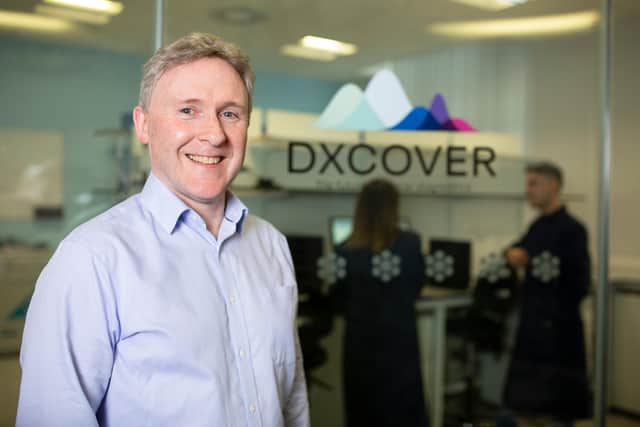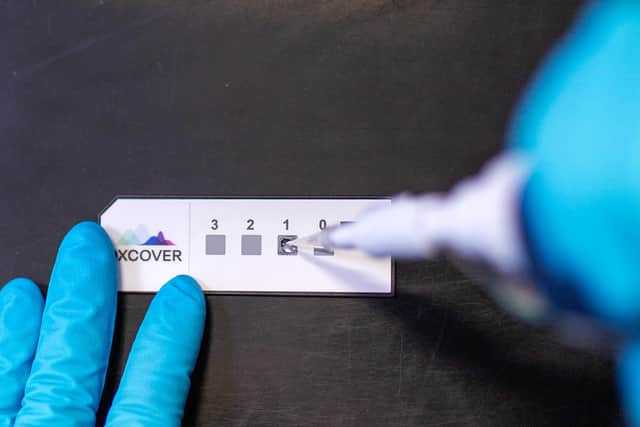The Big Interview: Dr Mark Hegarty, CEO and co-founder of Dxcover
It spun out from the University of Strathclyde in 2019 as ClinSpec Diagnostics, and moved to its current branding in 2021.
The firm has created the Dxcover Brain Cancer liquid biopsy, saying the simple blood test combined with artificial intelligence can rapidly fast-track patients suspected to have a brain tumour for further treatment.
Advertisement
Hide AdAdvertisement
Hide AdThe company’s offering in this area was in August hailed as capable of being “transformative for both patients and doctors” by Dr Paul Brennan, a consultant neurosurgeon at the University of Edinburgh, after a study showed the test was effective at identifying patients with tumours as small as 0.2cm.


Dxcover’s remit is also extending into early-stage detection of several other types of cancers.
Dr Hegarty has more than two decades’ experience in start-ups and healthcare products, with previous senior roles including 12 years as MD of contact lens firm Daysoft.
What does your role at Dxcover involve?
In a company at this stage of development, my role is very wide-ranging and hands-on.


There are the usual core elements of reporting to the board, investor relations, strategic planning, developing, and implementing the business plans; making sure the cash, staff, and resources are all in place to achieve the milestones that grow the value of the business and attract further investment.
Then there’s the recurring question, “where do I add most value today?” At 8am, it’s a roundtable engineering meeting, getting into the nuts and bolts of the design for an exciting new piece of hardware that will enhance our commercial options with strategic partners.
At 8pm, I’m with Dr Matthew Baker – chief technical officer and co-founder – as we do a Zoom pitch to potential Series A investors in Boston and New York. Matt and I have worked together for six years now and can almost read each other’s minds, but life in a start-up is never dull!
In January, the firm announced key certification in relation to its liquid biopsy platform, hailing this as a landmark, and a “great start to 2022”. Can you explain more about the significance of this approval, and elaborate on your plans for “further significant expansion” this year?
Advertisement
Hide AdAdvertisement
Hide AdWe operate in a highly regulated industry and ISO 13485 is the international quality standard. It’s at the heart of everything we do. ISO accreditation is vital to the commercialisation of the Dxcover Platform. In fact, it was a great start to 2022 in more ways than one, as the patent covering all our hardware has now been granted in the USA.
We are currently raising Series A funding, looking to generate £25 million to expand the company and take forward our pivotal clinical studies for the Dxcover Brain Cancer test, and to build on our very exciting multi-cancer capability.
We now have data demonstrating the ability of the Dxcover Platform to detect eight different cancers (lung, colon, breast, prostate, ovarian, pancreatic, kidney and brain) including early-stage tumours. These contribute to more than 65 per cent of the global cancer burden.
We have also already taken an option on a new 6,600-square-foot facility in Glasgow to treble our lab and office space, and when we complete the raise we will grow our research-and-development hub in Glasgow from 15 to 35 staff over 24 months.
In parallel, we will also take the major step of establishing a subsidiary company in the USA, to provide lab services for pivotal clinical studies with clinicians in the country.
Dxcover has received funding of more than £5m from the likes of Scottish Enterprise, Eos Advisory, SIS Ventures, and the University of Strathclyde – to what extent has that catalysed your growth, and what is your view on the level of support available for life sciences firms in Scotland?
There is a huge level of support for life sciences start-ups in Scotland. For us, it started with the superb High Growth Spinout Programme run by Scottish Enterprise. That provided grant funding that enabled us to move from university research to real-world clinical data, proving the technology was worthy of further grant funding from [innovation agency] Innovate UK and from equity investors.
We’ll be eternally grateful to Eos Advisory (based in St Andrews) who were the cornerstone investor for our spin-out as a company in 2019. To date we have raised just over £5m in a mixture of equity and grant funding, with the other UK investors being Mercia Asset Management and Norcliffe Capital.
Advertisement
Hide AdAdvertisement
Hide AdDxcover has cited Cancer Research UK finding that every year 12,000 people in Britain are diagnosed with brain tumours, and survival rates are as low as 12 per cent five years after diagnosis. To what extent can you help tackle this?
Over the past two years, we’ve been living through a global pandemic… however, we’ve actually been living with a global cancer pandemic for decades. Worldwide, 26,000 people die from cancer each day. Early detection is critical for effective treatment, but many cancers go undetected for too long.
In the case of brain cancer there are 250,000 new cases of primary brain cancer diagnosed globally each year. Currently there is no blood test available to assist clinicians, and access to brain scans varies widely from country to country, dependent on how healthcare is funded. Dxcover Brain Cancer is a low-cost blood test that can help clinicians prioritise patients for a brain scan and for earlier treatment.
Our aim is to help neurosurgeons see patients earlier when surgery can be less invasive, with less permanent side effects, and ultimately better prospects of long-term survival.
Glasgow surgeon Sir William Macewen carried out what is recognised as the world's first successful brain-tumour removal in the 19th century – do you feel like you are carrying on a historic legacy for the city?
We are certainly “standing on the shoulders of giants”. The Dxcover labs are in the Glasgow Innovation District, just a short walk from the Royal Infirmary where Joseph Lister pioneered the antiseptic surgical procedures that have saved countless lives. He was succeeded by Sir Macewen, who is recognised worldwide as the father of brain surgery.
Now Dxcover is based on Dr Matthew Baker’s world-leading research at the University of Strathclyde, and we’ll certainly be doing all that we can to continue to further improve patient survival and quality of life just as Lord Lister and Sir Macewendid all those years ago.
What has been Dxcover’s most pivotal moment to date? It won the Innovation category of the 2019 Scottish Life Sciences Awards, and the 2018 Higgs EDGE Special Award (named after Nobel Prize winner Professor Peter Higgs), for example…
Advertisement
Hide AdAdvertisement
Hide AdAwards are significant. However, the truly transformative moment for us is much less glamorous. It was on January 24, 2018, when we carried our prototype Dxcover Platform into the Western Infirmary in Edinburgh and began our first external clinical study with consultant neurosurgeon Dr Paul Brennan and the superb EMERGE team of research nurses who recruited patients to our trials.
That was the start of us building the real-world, clinical data that has proved the ability of our blood test to detect brain cancer and to detect it early when tumours are smaller and more easily removed.
What is your view on the scandal around Elizabeth Holmes, founder of Theranos [she was convicted of fraud after raising hundreds of millions of dollars by fraudulently claiming that the firm could test for a host of diseases including cancer from just a drop of blood]? Has it made it harder to convince people about what Dxcover is offering?
You probably couldn’t print what I think about her and Theranos! It is staggering that they were able to maintain their deception but partly this is because they purposely raised their funds from investors who were not experts in diagnostics and healthcare.
Frankly, it has had no impact whatsoever on Dxcover. The investors we are talking to are all experts in life sciences and their due diligence is thorough, fair, and very stimulating. We welcome it.
Looking ahead to 2024, five years after Dxcover spun out from the University of Strathclyde, what would you like the firm to look like? What are the biggest challenges, and which new areas would you like to have made in-roads into?
By 2024 our aim is to have launched the Dxcover Brain Cancer test commercially. The day we can say we helped save a life will be the true measure of our success, and every day we work towards that goal.
In five years’ time, we plan to have completed the second phase of our multi-cancer development and have embarked on the pivotal studies that will launch tests for other major cancers such as colorectal, lung, prostate and pancreatic.
Advertisement
Hide AdAdvertisement
Hide AdOne of the biggest challenges is that cancer is a very complex disease and there is still a massive amount to learn. Whether you are an ambitious young company based in Scotland or a multi-national with a billion-dollar budget, we are all pioneers in the field of early detection.
We would like to make major in-roads with NHS Scotland, using our collaboration with NHS Lothian on brain cancer as a template, and push forward pilot studies across multiple cancers. That would be a truly pioneering initiative for Scotland, with the benefits felt worldwide.
A message from the Editor:
Thank you for reading this article. We're more reliant on your support than ever as the shift in consumer habits brought about by coronavirus impacts our advertisers.
If you haven't already, please consider supporting our trusted, fact-checked journalism by taking out a digital subscription.
Comments
Want to join the conversation? Please or to comment on this article.
